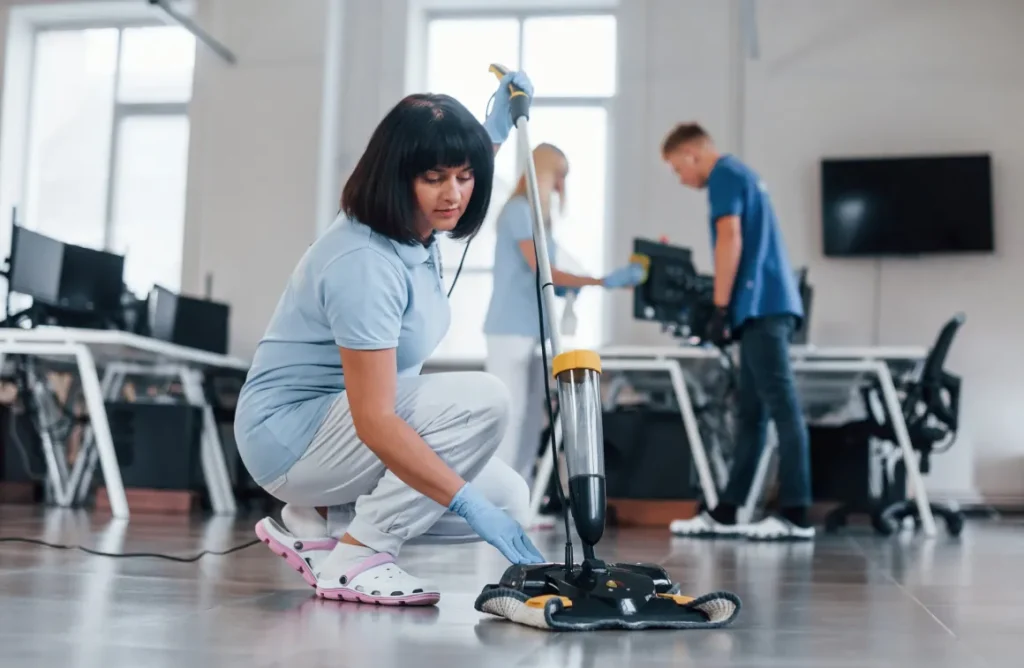Disinfection and Deep Cleaning – Commercial Cleaners Are Fighting the Spread of Germs
In the battle against germs and infections, commercial cleaners play a crucial role by employing advanced disinfection and deep cleaning techniques to ensure that environments are as safe and sanitary as possible. The spread of harmful pathogens, including bacteria and viruses, can be particularly rampant in high-traffic areas such as offices, schools, hospitals, and public transport systems. Commercial cleaners tackle this challenge head-on with a combination of thorough cleaning practices and cutting-edge technology. One of the primary strategies used by commercial cleaners is the application of high-quality disinfectants that are specifically designed to eliminate a broad spectrum of pathogens. These disinfectants are often formulated to target and neutralize harmful microorganisms effectively, ensuring that surfaces are not just superficially clean but genuinely sanitized. In addition to chemical disinfectants, many commercial cleaning services have adopted eco-friendly and non-toxic alternatives to minimize environmental impact while maintaining high standards of cleanliness.
 Deep cleaning is another essential component of commercial cleaning services. Unlike regular cleaning, which might address only the most visible dirt and grime, deep cleaning involves a more comprehensive approach that reaches into every nook and cranny. This process often includes the use of specialized equipment, such as steam cleaners and industrial-grade vacuums, to remove accumulated dirt, dust, and allergens from carpets, upholstery, and hard-to-reach areas. By thoroughly cleaning these surfaces, commercial cleaners help prevent the buildup of germs and reduce the risk of infection. In recent years, technological advancements have further enhanced the efficacy of commercial cleaning. For example, electrostatic sprayers have become a popular tool in disinfection efforts. These devices work by charging disinfectant particles so they cling to surfaces more effectively, ensuring even coverage and reducing the likelihood of missed spots. This technology is particularly useful in large facilities where traditional cleaning methods might struggle to reach all areas.
Deep cleaning is another essential component of commercial cleaning services. Unlike regular cleaning, which might address only the most visible dirt and grime, deep cleaning involves a more comprehensive approach that reaches into every nook and cranny. This process often includes the use of specialized equipment, such as steam cleaners and industrial-grade vacuums, to remove accumulated dirt, dust, and allergens from carpets, upholstery, and hard-to-reach areas. By thoroughly cleaning these surfaces, commercial cleaners help prevent the buildup of germs and reduce the risk of infection. In recent years, technological advancements have further enhanced the efficacy of commercial cleaning. For example, electrostatic sprayers have become a popular tool in disinfection efforts. These devices work by charging disinfectant particles so they cling to surfaces more effectively, ensuring even coverage and reducing the likelihood of missed spots. This technology is particularly useful in large facilities where traditional cleaning methods might struggle to reach all areas.
Moreover, commercial cleaners are increasingly employing data-driven approaches to improve their services. This includes using monitoring systems to track cleanliness levels and identifying areas that require more attention. These systems can provide real-time feedback and ensure that cleaning protocols are adhered to consistently, enhancing overall effectiveness. In addition to technological and procedural innovations, the training and expertise of cleaning staff play a vital role in the success of disinfection efforts. Commercial cleaning professionals are typically trained in the proper use of cleaning agents, equipment, and techniques, ensuring that they can handle various cleaning challenges effectively and Learn More about these services. This expertise is crucial for maintaining high standards of hygiene and safety. The importance of regular disinfection and deep cleaning cannot be overstated, especially in the context of preventing the spread of infectious diseases. By implementing rigorous cleaning protocols and utilizing advanced technologies, commercial cleaners help create healthier environments and protect public health. Their efforts contribute significantly to the overall well-being of communities, ensuring that spaces remain safe and sanitary for everyone.